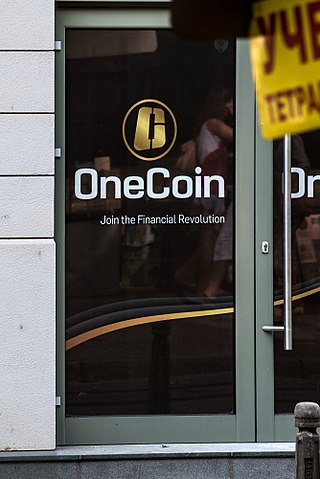
A pyramid scheme is a business model that recruits members via a promise of payments or services for enrolling others into the scheme, rather than supplying investments or sale of products. As recruiting multiplies, recruiting becomes quickly impossible, and most members are unable to profit; as such, pyramid schemes are unsustainable and often illegal.

Kirit Somaiya is an Indian politician of the Bharatiya Janata Party who represented Mumbai North-East in the 16th Lok Sabha and the 13th Lok Sabha. He is currently appointed as the vice president of Bharatiya Janata Party's Maharashtra unit.
Phone fraud, or more generally communications fraud, is the use of telecommunications products or services with the intention of illegally acquiring money from, or failing to pay, a telecommunication company or its customers.

Internet fraud is a type of cybercrime fraud or deception which makes use of the Internet and could involve hiding of information or providing incorrect information for the purpose of tricking victims out of money, property, and inheritance. Internet fraud is not considered a single, distinctive crime but covers a range of illegal and illicit actions that are committed in cyberspace. It is, however, differentiated from theft since, in this case, the victim voluntarily and knowingly provides the information, money or property to the perpetrator. It is also distinguished by the way it involves temporally and spatially separated offenders.

Qnet Ltd, formerly known as QuestNet and GoldQuest, is a Hong Kong-based multi-level marketing (MLM) company owned by the QI Group. QNet was founded in 1998 by Vijay Eswaran and Joseph Bismark. The company's products include energy, weight management, nutrition, personal care, home care and fashion accessories on an e-commerce platform.

The Saradha Group financial scandal was a major political scandal caused by the collapse of a Ponzi scheme run by Saradha Group, a consortium of over 200 private companies that was believed to be running collective investment schemes popularly but incorrectly referred to as chit funds in Eastern India.
The 2013 Kerala solar panel scam occurred in 2013, when a solar energy company, Team Solar, in Kerala, India, used two women to create political contacts with links including to the Chief Minister's office. The company duped several influential people to the tune of 70 lakhs, by offering to make them business partners, or by offering to install solar power units for them, and receiving advance payments for the same. Team Solar was unsuccessful in lobbying Kerala Govt to get their firm included in ANERT programmes.

Telexfree, a trade name owned by Telexfree Inc., was a multibillion-dollar Ponzi scheme disguised as an internet phone service company. Prosecutors have described it as the largest fraud of all time in terms of the number of people affected - more than 1 million, with victims in various countries. The brand became best known for its operations in Brazil held by Ympactus Comercial Ltda after it was involved in an ongoing investigation and trial for operating a Ponzi scheme, and later for having its operations suspended in the US by SEC under the charges of operating a multibillion-dollar Ponzi and pyramid scheme.

A technical support scam, or tech support scam, is a type of fraud in which a scammer claims to offer a legitimate technical support service. Victims contact scammers in a variety of ways, often through fake pop-ups resembling error messages or via fake "help lines" advertised on websites owned by the scammers. Technical support scammers use social engineering and a variety of confidence tricks to persuade their victim of the presence of problems on their computer or mobile device, such as a malware infection, when there are no issues with the victim's device. The scammer will then persuade the victim to pay to fix the fictitious "problems" that they claim to have found. Payment is made to the scammer through ways which are hard to trace and have fewer consumer protections in place which could allow the victim to claim their money back, usually through gift cards.
Ezubao was a peer-to-peer lending scheme based in the eastern Chinese province of Anhui. It was set up as an online scheme in July 2014, attracted funds of about 50 billion yuan from 900,000 investors, and ceased to trade in December 2015. On 1 February 2016, the scheme was closed down and 21 involved people were arrested. Zhang Min, the president of the parent company, Yucheng Global, told investigators that the company operated as a Ponzi scheme.

The Freedom 251 is a smartphone that was initially offered for sale in India at the promotional price of ₹251. Sold by Ringing Bells Private Limited, and marketed as the world's cheapest smartphone.

OneCoin is a fraudulent cryptocurrency scheme conducted by offshore companies OneCoin Ltd, based in Bulgaria and registered in Dubai, and OneLife Network Ltd, both founded by Ruja Ignatova in concert with Sebastian Greenwood. OneCoin is considered a Ponzi scheme due to its organisational structure of paying early investors using money obtained from newer ones. It was also a pyramid scheme due to the recruiting of investors without providing any actual product. The company secretly conducted database entry scam simulating transactions not registered by an actual blockchain, and with no mining behind the apparent cryptocurrency release and circulation. Many of those characters central to OneCoin had been previously involved in similar and different other schemes and business malpractices separate from each other. OneCoin was described by The Times as "one of the biggest scams in history".
An IRS impersonation scam is a class of telecommunications fraud and scam which targets American taxpayers by masquerading as Internal Revenue Service (IRS) collection officers. The scammers operate by placing disturbing official-sounding calls to unsuspecting citizens, threatening them with arrest and frozen assets if thousands of dollars are not paid immediately, usually via gift cards or money orders. According to the IRS, over 1,029,601 Americans have received threatening calls, and $29,100,604 has been reported lost to these call scams as of March 2016. The problem has been assigned to the Treasury Inspector General for Tax Administration.
Webwork was an Indian website portal accused of being a Ponzi scheme. The site was promoted by a Bollywood star, and was said to have scammed Rs 125 crore from users. Webwork's directors were arrested in February 2017.

Bitconnect was an open-source cryptocurrency in 2016–2018 that was connected with a high-yield investment program, a type of Ponzi scheme. After the platform administrators closed the earning platform on January 16, 2018, and refunded the users' investments in BCC following a 92% coin value crash, confidence was lost and the value of the coin plummeted to below $1 from a previous high of nearly $525.
Amit K. Bhardwaj was an Indian who was involved in big scam who founded Amaze Mining and Blockchain Research Limited which ran GB [Gainbitcoin] Miners among other bitcoin-related businesses and projects, these have been described as various types of Ponzi schemes.
I Monetary Advisory (IMA) was an Indian investment company, with headquarters in Bangalore. Its collapse was one in a long line of similar collapses over the preceding few years, of companies purporting to be Islamic banking companies, with investors in India and the United Arab Emirates, that investigating authorities afterwards stated to have been Ponzi schemes, including: Heera Group; Morgenall, Capital Plus, and Capital Infrastructure ; Injaz International, Ajmera, Aleef, Aala Ventures, Ambidant, and Burraqh; and Sunfeast Infotech, SpeakAsia, MMA Forex, Gold AE, Ferryland Tourism, UT Markets and Exential Group. Total losses to investors over 14 such companies have been conservatively estimated at ₹5,000 crore (US$630 million) with the loss due to IMA alone estimated at ₹2,500 crore (US$310 million)

COVID-19 scams are frauds whose cover story primarily relies on the existence of the COVID-19 pandemic. Such scams have been reported in multiple countries, primarily the United States, Canada and the United Kingdom.










